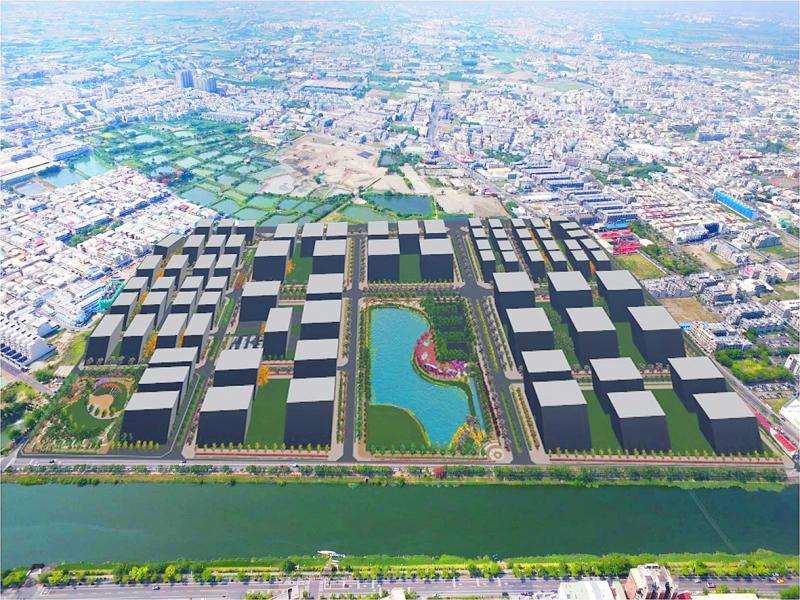Tainan recorded the highest growth in urban land prices among Taiwan’s 22 cities and counties, while outlying Penghu County saw the steepest fall in urban land prices, Ministry of the Interior data showed.
Urban land prices in Tainan from Oct. 1 last year to March 31 rose 0.68 percent from the previous six-month period, the data showed.
The increase was driven by a 0.94 percent rise in land prices in the city’s industrial zones, such as an industrial park in Madou District (麻豆) and a logistics hub in Yongkang District (永康), the ministry said.

Photo provided by the Tainan Land Administration Bureau
Growth in Tainan beat the average 0.16 percent increase in urban land prices for the whole of Taiwan in the period, when the national urban land price index was 100.9.
Over the past nine half-yearly releases, the index has remained within a 1 percentage point range, indicating that urban land prices nationwide have been stable, the ministry said.
The index is based on the median price of residential and commercial properties and industrial zones in a city or county. The ministry releases the index on Jan. 15 and July 15.
In the latest index, urban land prices in Penghu County fell 0.43 percent, the steepest decline in Taiwan, the data showed.
The ministry attributed the decline to slow-season effects in Penghu’s tourism industry, saying that the COVID-19 pandemic kept many tourists away and slowed business activity.
The residential property price subindex for Taiwan rose 0.19 percent, the industrial zone price subindex grew 0.42 percent and the commercial property price index fell 0.04 percent, the ministry said.

Beijing could eventually see a full amphibious invasion of Taiwan as the only "prudent" way to bring about unification, the US Department of Defense said in a newly released annual report to Congress. The Pentagon's "Annual Report to Congress: Military and Security Developments Involving the People's Republic of China 2025," was in many ways similar to last year’s report but reorganized the analysis of the options China has to take over Taiwan. Generally, according to the report, Chinese leaders view the People's Liberation Army's (PLA) capabilities for a Taiwan campaign as improving, but they remain uncertain about its readiness to successfully seize

Taiwan is getting a day off on Christmas for the first time in 25 years. The change comes after opposition parties passed a law earlier this year to add or restore five public holidays, including Constitution Day, which falls on today, Dec. 25. The day marks the 1947 adoption of the constitution of the Republic of China, as the government in Taipei is formally known. Back then the Chinese Nationalist Party (KMT) governed China from Nanjing. When the KMT, now an opposition party in Taiwan, passed the legislation on holidays, it said that they would help “commemorate the history of national development.” That

Taiwan has overtaken South Korea this year in per capita income for the first time in 23 years, IMF data showed. Per capita income is a nation’s GDP divided by the total population, used to compare average wealth levels across countries. Taiwan also beat Japan this year on per capita income, after surpassing it for the first time last year, US magazine Newsweek reported yesterday. Across Asia, Taiwan ranked fourth for per capita income at US$37,827 this year due to sustained economic growth, the report said. In the top three spots were Singapore, Macau and Hong Kong, it said. South

Snow fell on Yushan (Jade Mountain, 玉山) yesterday morning as a continental cold air mass sent temperatures below freezing on Taiwan’s tallest peak, the Central Weather Administration (CWA) said. Snowflakes were seen on Yushan’s north peak from 6:28am to 6:38am, but they did not fully cover the ground and no accumulation was recorded, the CWA said. As of 7:42am, the lowest temperature recorded across Taiwan was minus-5.5°C at Yushan’s Fengkou observatory and minus-4.7°C at the Yushan observatory, CWA data showed. On Hehuanshan (合歡山) in Nantou County, a low of 1.3°C was recorded at 6:39pm, when ice pellets fell at Songsyue Lodge (松雪樓), a